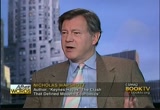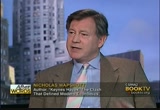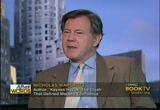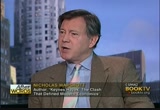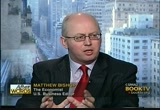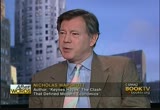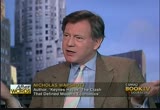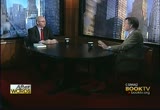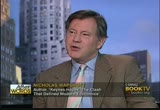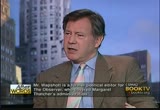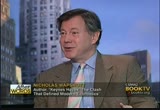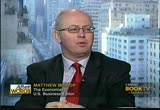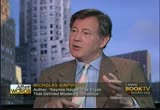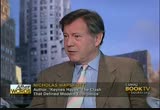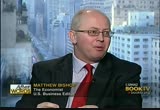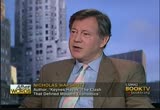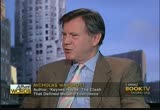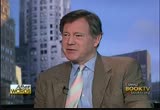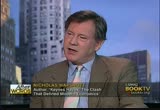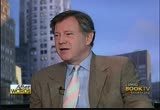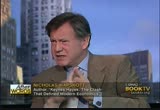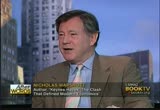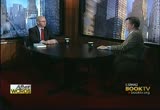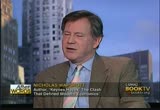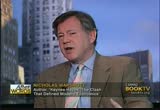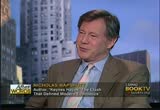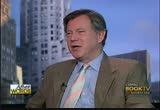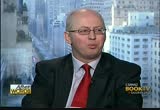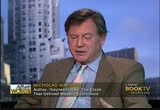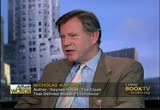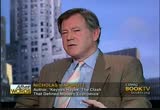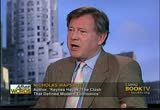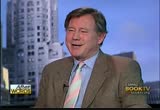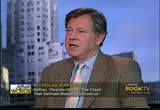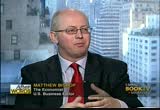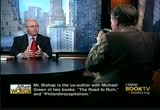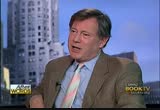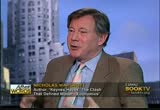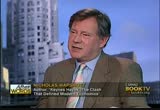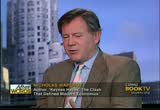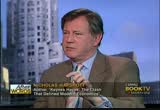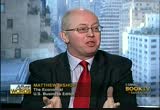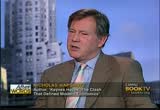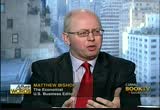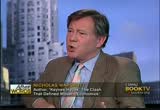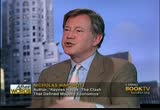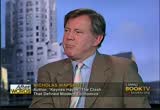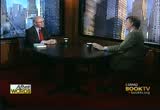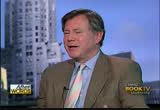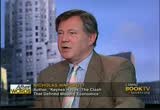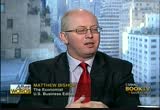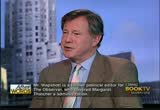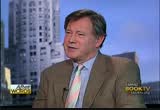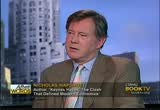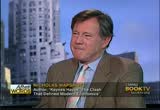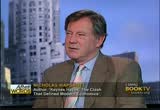tv Book TV CSPAN October 30, 2011 12:00pm-1:00pm EDT
12:01 pm
12:02 pm
ronald reagan and margaret thatcher tackles economic theory, exploring the virtues of the free market versus one in which the government intervenes. he discusses the competing perspectives and the men who made them famous with u.s. business editor of "the economist" magazine, matthew bishop. >> host: so, one of my favorite quotes from john maynard keynes is the one about how practical men often slate to some defunct economist, and you've written a book about two defunct economists. mr. keynes and friederich hayek. why do they matter today? >> guest: it turns out the great dividing line in terms of modern economics between whether you start entering in economy and trying to manage it and those of people say don't do that because it will only cause enormous mess and will have to clear up eventually, was 80
12:03 pm
years ago when john maynard keynes was the most inventive because of his day, certainly the most influential economists of the 20th century, started working out theories which looked a bit added to the way. which traditionally what economists do. he started looking at as if he hovered above economics and looked at it in what became known as macroeconomics. he looked at the big picture about different elements, different moving parts. also because he was talking when britain suffered a great deal of unemployment. and at the time from 1929 to the subsequent collapse in the american economy, large-scale unemployment was a great problem. he was looking at it from a practical point of view. is there anything a government may do to an economy which might to some of his poverty, terrible addition of peoples not been able to find work for years on end. it turns out that this key
12:04 pm
division between whether you into fear or don't interfere turns out to be the principal political issue of this electoral cycle. it's been submerged for a very long time. not least because when the keynesians managed to succeed, enjoyed three years between 194-51-9975, manage the economy for the benefit of, let's say the population. they made the economy bigger. between 1975-2008, say, we had a different thing. we had a notion that keynes was right in principle but what we should try to do is ration the amount of new money that you peace into an economy so that an economy wouldn't get out of kilter. >> host: some of the same schooling? >> guest: he didn't think very much of his economics. neither he nor there. the principal was what keynes
12:05 pm
and hayek fell out over was economics. but actually the strength of hayek turned out to be interfering in economy because keynes suggested you can pump money in economy can you contract, government may do that, government may cut taxes drastically. it made ease credit to ensure that business activity picks up. notwithstanding all of these various things the government may do, hayek said yes, but all of those things into increasing the size of the government. there's a problem about that. and that is that the more you increase the size of government, the larger the proportion of an economy is spent by government agents rather than by the people themselves, that is through taxation rather than people spinning out of their own pocket, the more likely you are to have -- he added something which certainly, a great echo in
12:06 pm
the tea party movement among a lot of libertarian thinkers in america, even some conservatives, that actually it's the government itself which is the problem. that, of course, is something which has resonated since ronald reagan, or maybe even since barry goldwater in the republican tradition. it's the distant sight of the family, the main tradition of republicanism. but the high i can set a different point of view. that an absolutist point of you about what should or should not be done. government itself turned out to be a problem as far as hayek was concerned. but because keynes solutions was irrelevant to the fact was even if they did were, let's say the war, the fact is hayek said that's a bad idea because they don't want the state to be too big because that checks for individual choices and that is the basis of free choice. >> host: what strikes me in
12:07 pm
the book to the extent you get into the personalities and how keynes and hayek interacted with each other. you think about the debate today in politics and there's a real shouting match going on, the tea party ride that endorses hayek and have opposition is to keynes and likewise the keynesian kirkman being an obvious voice to the keynesian school. although i think we disagree how much keynes would have endorsed his position. there's a sort of intolerance was in the book it's quite clear that hayek had enormous admiration for keynes. i'm not sure whether kinds until keynes admired and hayek. >> guest: they really quite like each other. certainly your right about hayek liking keynes. keynes -- hayek already knew in as much as keynes was famous only by the time that hayek
12:08 pm
moved into full employment as an economist. he did that through pointing out the treaty of versailles would be tragic for europe and would lead to a second world war, which, of course, was triggered hayek was an australian and was in the austrian army during world war ii. he knew from his own personal experience the amount of inflation that devastated austria at the end of the war was, that keynes was right. that was the way towards extreme politics. and so he started off knowing keynes was sort of a mythical heroic figure. and in a way that departed from hayek. hayek always maintained enormous respect for keynes. if there wasn't for churchill i don't think you could doubt that keynes was the greatest englishmen in the 20th century. he was an astonishing creature. i wish we could meet him. he was plainly a person capable
12:09 pm
of juggling with many different balls at the same time. his achievements are astonishing, even if just one career was on track in good. he would've been an an astonishing person. he bought pictures for the national gallery. he was on insurance company, the board. a day trader. he used to stay in bed until noon every day on the telephone to the stockbroker sang cell this. actually, again, he was a speculator. he understood market more than the people of today. >> host: hindsight, he is the face of big government were in fact he was actually in many ways an ardent capitalist in the 1930s whether it much more extreme views. >> host: it is one of the problems. in the modern political debate
12:10 pm
because words were bandied around so then, so obama is a socialist. came to was a socialist. and not really. not really. but to go back to the keynes and hayek thing, the problem was that hayek was brought in by lions who is a professor of economics, specifically in order to counter keynes. the thing was set up already for what could be a battle. robbins had a battle with keynes in a bank in the committee or a government committee. that started off pretty sharply. you must remember of course this is not your gentle to in front of an argument in a bar. this is pretty high flown stuff on pretty tough measures. keynes was a king's college person. his trade really was sarcasm.
12:11 pm
it protected him. hayek was a difference of opinion he would literally but no. his jacket had three buttons all down. he was a very well mannered, both brought up to treat each other probably. but when it came to important things like disagreements over economic debates, then they just took the gloves off. so right from the very beginning, the keynes hike debate was, there've every twitch of the to the extent other academics came in and said, pull them apart is that this is not the way to conduct academic faith. please don't talk in these terms. but it set a trend which lasted until this day with the keynesians despise the hayekian. for decades they pretend they didn't exist. if you look at the genius, three volume biography of keynes, to
12:12 pm
hayek it is barely mentioned. >> host: why is that? >> guest: i guess you could thought i was talking to keynes in keynes didn't take any account of hayek. even though he found it rather exhausting after a little while a bandmate and get it over to the minions to continue the harassment. but he did, so-called cambridge circus, this wonderful group of young economists around keynes were as pugnacious as keynes and so. of course, they learned literally at his knee. in his rooms in cambridge they would do big things it could get very for them. fellow also show was, by the way, when you leave tonight, it's like las vegas. when you leave king's college, things occurred. but hayek was quite capable. one of those things we know of the austrian or german speech is that very often it might be more
12:13 pm
abrupt. christmas of the austrian debate meant, it's true even today, we are taken aback when the comeback and austrian or german, ask them a profoundly personal question. that in that case hayek gave as good as he got. and the result was certainly in the initial battle when the two men actually locked horns they didn't lock horns and he didn't let go. they barely actually scored a genuine point against each other in a real debate because they were too busy sniping each other about investment. what you mean by savings? investment. i'd like to know more about what you mean by replenishment of stocks. they both got deep down into the weeds, into the long grass. and didn't escape from. >> host: let's try and grab their different views in today's
12:14 pm
terms. how would you define today the hayekian, a keynesian? >> a hayekian is him who is suspicious of all government efforts to manufacture to move the economy. hayek was to on this right from the very beginning of the hayekians remain true today. and its austrian economics jenin. jenin. thing to say actually the market, over the long-term cures itself and eventually there will be an equilibrium where everybody is employed once again. >> host: so under these economics you can have market they. you can have bubbles and crashes but somehow that is something you just have to get used to and live with and ultimately the economy will find its own way and we'll all get more prosperous, is that the idea? >> guest: absolutely. he made a virtue out of the same there is destruction which is
12:15 pm
necessary in order to ensure the economy continues to grow and expand. >> host: and keynesian? >> guest: what they do is to look at society and they say 9.3% unemployed, 15% of them have been unemployed for six months or whatever, longer. then they start looking at how my young people, how many minority's and so on, what are the proportions. they come to the conclusion this is intolerable and the government should intervene. by which ever method they think is best. they have made interest rates zero. said anybody wants to borrow, to invest in anything is not going cost anything. the problem with that as keynes is you can't push on a string. you can expand something but if people don't leap into the void,
12:16 pm
after all, companies have so much cash they don't need to borrow, that's not getting very far. keynes also suggested, this is not almost politically impossible whether it divides the government with congress on one side and not really willing to compromise anything. is to directly employ people, the so-called shovel-ready project. we don't build schools. we build roads. as a matter of current debate right now exactly what obama's jobs bill says it's all about. that's what we want to do and we also want to cut taxes. if you'll and increased demand in the economy which is what keynes said, lifted up by providing extra electricity or something, if you lift you can do that by cutting taxes. >> host: hayek's views sound like sort of a counsel of despair, and he sends keynes the thing we're all intelligent
12:17 pm
people, or at least some of us are intelligent, how our government exists to apply our intelligence to try to sell some of these big challenges the world faces, whereas hayek's views sound like basically saying for all our intelligence there's basically nothing we can do through government. it does sound like despair, or is there more to that? >> guest: there's not too much to it. it is a pessimistic view of the world and that is when it comes to some things, knowledge and intervention helps, medicine or whatever. it does depend, of course to hayek, what stage the discipline you are at. he thought keynes was a total wrong direction. and when hayek was awarded his nobel prize, he said i come here to apologize for the economics profession. the fact is we have done a
12:18 pm
terrible job and it's going to take decades to get out of. unless we start now, he actually lectured saying we have taken a wrong turn back in the '50s and is going to take a long time to ever get back to a free and open society. it does big question of course when we're talking about politics today exactly what a hayekian economy, a genuine hayekian economy would look like. it's all very well to be a hayekian agitator is like to constantly snipe, we don't want any raising of taxes, we don't want more government spending, these are absolutes but we're not going to agree to anything. but nonetheless the battle lines are drawn in exactly that. if hayek's world would come about, well, size of the economy is very large due to all sorts of things, but things like as we know things like pension, would
12:19 pm
they do without pension? some people are nibbling around the edges of that. >> host: he basically said government should only do the absolute bare minimum to allow society, essentially around defense. was the also in favor of property rights? >> guest: absolutely. exactly. rule of law, the thing he wagged about. about how the rule of law was essential to society. >> host: he was cited as an advisor, inspiration by both mrs. thatcher and ronald reagan every much people regard the thatcherism and reaganism as to hayek, hayek and his thinking. how much in reality did what those two leaders produce actually, stand up against what hayek action wanted? >> guest: thatcher famously when she went to give research
12:20 pm
department they were discussing what they believe, she got out of her handbag, slammed down the "road to serfdom" on the table and said this is what we believe. so there's no doubt what she believed was to introduce for the first time actually to the conservative party and ideology. a real checklist of things you should try to attain which came out of the book. republicans in the past never used to do this. were they really hayekians? hayek went out of his way whenever asked, just make the call, i'm not an adviser to mrs. thatcher but i do not advise ronald reagan. he always denied -- post that because he disapproved of? >> guest: he thought they were not wholehearted enough. he thought they got the message.
12:21 pm
it's a matter of the difference between saying are you going to use this in order to manage the world closer to your way of thinking, or do you intend to introduce the whole scheme, which hayek recommended. in which case we'll have an uncomfortable time, however long it takes even if it takes 20 years it will be a very uncountable 20 years because all sorts of things will disappear. including all sorts of things do with democracy. hayek didn't believe, he so believe in prices, he so believed in the market he thought even things like town government shouldn't exist, that should be handed over to a corporation. he didn't believe the pound dollar -- sorry, the dollar should exists. he believed there should be private companies, each issuing currencies and we would eventually come to understand which was a strong currency and which wasn't and how to use it.
12:22 pm
he also believed by the way something that hayekians believe, he believes there should be a free market in labor, there should be no borders between nations. a lot of this real hayekian stuff runs very counter to people who say they are a hayekian. 's main problem about reagan and thatcher, no doubt, that's an indication if they didn't do any much in hayek's terms it shows what a real hayekian future might be, how radical it might be. most of us would believe i think reagan and thatcher noticed a change -- noticeably changed the way we understand. got more credit for the things that hayek suggested such as a return to the free market instead of mixed industries. it is unbelievable if you think when thatcher took over from labour in 1979, bus services, the posts office, steel,
12:23 pm
shipbuilding, had overtime a created the states and that privatization was the beginning of first step towards the state selling off all the business. she had 13 years and the conservatives have been fighting about ever since what her legacy men. interestingly in britain right now we are in sort of an experiment. the fact when the conservatives coalition look at the books when had a discussion with the bank of england they were told there was a bailout problem about sovereign debt because britain had borrowed heavily as all western nations borrowed heavily in 2008 disaster. you could do two things. you could start paying it off soon or you could manage the economy and get that back to health and then pay it off later.
12:24 pm
in their wisdom, cameron and others decided they would pay off sooner rather than later and the result is as we can see they haven't quite got to a double dip recession yet, i mean, the figures are heading south. we are talking 0.1 growth in britain. >> host: do you think that cameron and his advisers actually have read hayek or have any interest in that kind of intellectual debate? >> guest: i think she read it and reagan was a great leader. he was much more serious. but have cameron and osborne read keynes and hayek? >> host: and obama certainly not red keynes. >> guest: i don't think obama should too much about economics
12:25 pm
at all. nor has roosevelt. roosevelt had an instinct what to do. obama has a less sure touch. considering both osborne and cameron read ppe which of politics philosophy and economics at oxford, the fact i don't think have a real grasp of keynes and have a very slender understanding of hayek. it's not good. >> host: now, talk to me about about "the road to serfdom" and how that book came about, and what drove hayek to write that in that point. >> guest: very interesting because, and it came about in an odd way. hayek had moved britain in about 1930. he was none of the things you would guess about an austrian. he was not sympathetic to the right. for all things he didn't fit in the cushy.
12:26 pm
notwithstanding the fact that he had letters of recommendations, he was director general of the bbc and presidents of others in order to get a job to help wartime britain. he was turned down. i thought that was actually a turning point of history. they should have just hayek, amazingly valuable. he had great insights into germany and austria. extraordinary brain which was able to tackle things like rationing. practical things you might need to do in a wartime society. but anyway, they said no, thank you. the result was that he devoted the war to writing what he thought was, he was aiming at more to the left than the right. he was anxious about when the war was over, that because the war had been seen future unemployment and a keynesian way, that governments would
12:27 pm
increase the size of the state wholesale and he thought into play the dangers of soviet communism. he was more worried about being defeated. so that's exactly what he said about trying to do. >> host: it wasn't sort of a cozy social democracy. it was a nasty, brutal regime. >> guest: he look at the recent evidence of cannot see the leadership. that i just happen to the world. it wasn't too difficult of a warning because the war went terribly wrong, because churchill have read a lot of things, half read "the road to serfdom" or he, he jumped to the
12:28 pm
conclusion that if the labour party, the gestapo, there'll be a british to stop and his foolish enough to say this. and this came directly out of hayek which allowed them another reason people ended up sliding hayek because all of the social democrats had nothing to do with communism at all. comments were the chief rivals. suddenly found hayek same there would be just as bad as communists. it took hayek out of the game. >> host: in book you talk about how sweden and some of those scandinavian democracies have emerged now, i guess the definition of big government and yet no one would look at those as awful places to live. in fact, quite good in this country. to what extent is the reputation
12:29 pm
of the hayekian view? >> guest: i would say pretty much. it does strike me as being an oppressive society. you don't have to go too far out of the way from the city to find good americans who would say, to have single-payer health care is itself a tyranny. it's as close how you define your liberties. >> host: would hayek have recognized that? >> guest: yes, he did. and hayek actually had, in never address are properly but if he was here it would be very interesting to hear what he had to say because he said, look, the scandinavians country look on the face of it, tranquil, calm, civilized sorts of places, but then they are full of people with turmoil which comes out having so many other market choices removed by the government. that's why they commit suicide so often.
12:30 pm
>> host: on that note let's take a short break. >> host: today we talk about the hayekian school, the keynesian school, and one could easily make a mistake of thinking those schools just arose by accident, that people admired their work and so forth and decided to fold them. but in reality they were actually quite deliberate builders of movements and maybe you could talk a bit about how they said about creating an army of followers. >> guest: keynes a simple way of doing it because he had a product to sell. in 1936, or by in a 1986 he
12:31 pm
completed his general theory, where he described exactly how i can do with the economy you could make it operate at a higher plane. therefore, employ more people. at least to his own satisfacti satisfaction. and this was a message that sony people wanted to hear, not least in america. when the boxes of general three arrived and were ripped open as if they were contraband. it was an astonishing thing. that desire to be at the forefront of the new and exciting and optimistic movement which was how to cure the unemployment which occurs america for a decade, you conceal obviously keynes himself were very attracted, very eloquent, very smooth, and how that's almost a movement waiting to form. hayek was in a different position because no sooner had the war ended and keynes had
12:32 pm
largely designed to peace, he was the architect of the piece, designed things like the imf. he designed the bretton woods currency flotation, marginal flotation. you wouldn't imagine there was much less for hayek to do. he had a very odd opinion of himself. he thought he was better known than he was. when keynes died, he said before when keynes was alive i was on amazingly unknown. but as soon as keynes that he was lifted to sainthood and i was turned into oblivion. he was profound for them. this was a lifetime's work and keynes was dead. canes had one in the foreseeable future was keynesian witch and it was, at least for three decades. you could argue it is keynesian to this day, i would. economics is a keynes.
12:33 pm
so in defeat, hayek, however, chose extraordinary reserve in the character he had come decided after a very short interval to support all of those people had resisted keynes, who are likely to be sympathetic to trying to find an ideology which would counter keynes wholesale. he invited them all to a hotel in switzerland. that was the crucible of what turned out to be the ideological revival of conservatism and the injection -- >> host: when was this? >> guest: 1946. this is also where conservatives and libertarianism got into the same bed. friedrich hayek invited as many -- i don't think, he knew they
12:34 pm
were a maverick law. just invite anybody who looked as if they might agree with him, and just, from that time on they may year after year after year. they fought with each other all the time. stormed out when instead you are all a bunch of communists. it was a lively stuff. it would great to have been there. and to be invited to the meeting, to attend the first meeting is for a modern conservative and ideological bent rather than like having arrived on the mayflower. this is absolutely key. hayek had taken a leaf out of his book. keynes to the '20s and early '30s to adopt is measured and he got nowhere. fact is that orthodoxy was own control, unsympathetic government in britain. >> host: they didn't find them persuasive. >> guest: churchill found in persuasive.
12:35 pm
the rise of hayek's movement is interesting because it he decided he would do just its keynes did with the general pigott instead of trying to spending money on lobbying interests or persuading representatives, congressmen, senators, presidents of the way to go forth, if you convinced a large body of the academic community and they taught pupils and so on, then it would become, it would become much more firm as a theory and it would allow people to join in or not to join in as much as they wonder. it would provide a strand of thought which was deliberately contradictory to keynes. and that's exactly the way it worked out. all sorts, americans, large groups, big business groups or
12:36 pm
maverick self-made businessmen who have always believed that tinkering with an economy for the government to get too large is an un-american thing. >> host: i suppose it led to the chicago boys in terms of the whole movement. university of chicago that was really about free markets. >> guest: they were already there. you're quite right, but it's interesting that although milton friedman and a couple of others were invited to the first meeting, they thought this was an excuse to go for a freebie in europe and play bridge. they recruit a fourth person so they would have somebody to play bridge with. they didn't take every service they. they came with the assistance as hayek. in fact, they didn't think much of it as i mentioned before as an economist. >> host: it's interesting. as you say, keynes today is
12:37 pm
economics and friedman, who in many ways, the tea party would look to that sort of one of their favorite economists. you know, he actually endorsed much of the keynesian framework, even though i guess passionate. >> guest: he said as much. he said anyway, we are all keynes today, but he went on to say because the way we understand the world is macroeconomics. on the other hand, he said, the fact is the government is too large. the only way you can cut the government is to cut the government. stop spending and weight, wait for the pressure of a deficit is much more strong upon a president than it is to have some leftover spending. >> host: i'm also struck by how another, i guess the heroine of the tea party movement, ayn rand.
12:38 pm
she reacted to "the road to serfdom" with him very fierce of use. >> guest: yeah. i mean, i must say that this reminds me about those sort of endless debates that you should take place on the left. was rosa luxemburg a better or worse person than trotsky? they hated a next-door neighbor in more they hated the person who should have been there enemy. and ayn rand future spirit hayek. it's true, i think, hayek did say it's, said some unlikely things. i don't see any reason why people shouldn't be given proper pensions and proper health care. everybody should at least have out. that was a step too far for
12:39 pm
people like ayn rand. >> host: and he told the government to provide that the. >> guest: yes, he did, yeah. something which is rarely mentioned i hayek. if everything else is going to be private, there are some things that any state should guarantee, and that is at least the ability to stay alive and to remain healthy. >> host: why did he think the state would be capable of funding that kind of welfare? >> guest: well, i mean, these times change. i think the national health service was introduced to britain in 1945. no one would've imagined that leaps and bounds health care itself would take, that medicine would take. and the cost of the. but also was, we've been talking about like pensions on hold. when pensions were invented people were living two, three, if you're lucky for years beyond pension day. now because of good health, actually due to many of the things the welfare state, keynes
12:40 pm
helped to help introduce we are now living much longer. i'm not sure if hayek had to revisit this if you would agree. he might think there may be another way to do it. >> host: in terms of his theories, i mean, how much was he actually willing to predict about how the world would actually turn out in reality as opposed to what he thought it ought to be like on paper? he lived long enough to see the collapse of the soviet union and the iron curtain come down. was he surprised when that happened? >> guest: know, because nothing surprised hi. use one of those people who had all worked out in advance. he thought communism was a perfect example of the contradictory economy. if you sublet the discretion to spend money to a cadre of communists and you take it away from individuals, in which end up with is a society, all of the
12:41 pm
horrors that that entails, and also sooner or later it will collapse because you can't resist a natural force of people wanting to bargain, wanting to trade, wanting to spend, which he thought was one of the core things that made of humanity. but also he said that if the price mechanism had been invented, that is, if one day somebody came out with intentions and said this is what we need to do, he said it would be considered the single most important elements of human life. the fact that prices was the key to everything because that was where the millions, billions of people in the world bark and one and one with each other and agreed to at least something. and he was always very wary of going much beyond that, and he said it will happen. i can tell you what happens, one of his problems, when countering
12:42 pm
keynes, he was someone who was in a stare and he really didn't have anything much to put into place with the things he had shot down. so he could point out all the reasons why keynes was wrong but when it was what do we do, he said i wouldn't do anything because i would know enough to do. we don't know enough about this. >> host: was this the essence of his three, at essentially things were just too complicated for anyone imposition or authority to actually be able to know what you're doing was the right thing, or was it more about a fundamental view, you know, what one's political freedoms ought to be? >> guest: it came from both angles. the first one was being practical. he said it is impossible to understand what is in the minds of everybody. and, therefore, how could a government agent make the right decision? for every 100,000 to please, he displaced at his least as many. that's because he wasn't making
12:43 pm
a proper marketization himself. he was making a decision on behalf of others. of course, he has other agenda. in his nobel lecture, which is well worth revisiting, hayek said that it was a bit like going to a football match, where you knew all the vital statistics of all of the individuals involved. their ages, hayek, ability, and you knew all of that. you knew what the weather was like. you knew what the time of day was like. unit all the personal circumstances of the people involved. in trying to predict will be the result of the game. he said it is impossible to know that much information about people, and we will never -- >> host: that raises an interesting.
12:44 pm
they do all this is physics on baseball and they come up with a formula whereby you recruit a certain number of players, statistical performance that you can predict. in the end you have a team i guess ultimately the red sox got rid of the curse of the babe by this exact approach. i wonder and since hayek, had he known the computing power that was available now, in the era of big data, whether he would've taken a different view as to the technical feasibility of having economic policies designed they some pretty good information about the world. >> guest: i doubt it. he didn't believe in the aggregate. so there was no, he couldn't take all postmen or all pictures, or all baseball players and try to work out whether it was a sub economy with rules that would apply to that group. he said it couldn't be done.
12:45 pm
part of the argument that he had was that one of keynes' accolades assist keynes it finished dusting them off, he handed him a off to finish the job. one of those arguments was exactly about whether each commodity had its own natural rate of interest. it's too technical to get into but the fact was there is a different natural race for apples as there are four pairs, but he was not, hayek was not prepared to get involved in any of that because he said that was too much of a leap. you couldn't even bring apples together, or bring oranges together. he always used to suggest it was like early surgery. economics is like early surgery. better to do nothing can actually picture sought out and start hacking limbs off your. >> host: were as keynes felted
12:46 pm
like dentistry, hand over to some technician she would be able to keep her teeth looking good. and i guess you really think that hayek ultimately believed that they would never move beyond early surgery, never reach that technical proficiency, that keynes thought? s. mckee put so much work in the individual, and i suppose his admiration for this, for individuals, starting off with himself, that he never like anybody else to have an assumption on his behalf. i think maybe his own mind which unique. >> host: do you believe in progress? >> guest: i don't know that he would even be able to come to conclusion about what progress would be. progress just echo that it is moving in a positive direction. i think he would say one person's policy does not mean
12:47 pm
another with negative. you just got to sit and watch it. there's no sense in pressing progress. but no, hayek want everything to go at a fair speed. >> host: in the book to describe hayek as a utopian of the kind. i mean, surely there is a belief in a better perfect world one might live in. >> guest: yeah. there are contradictions to put it mildly. and both keynes and i. you will always find places in any individual thought, any thinkers thought. when they contradict each other. at the meeting he decided what was missing from his logic was the warmth and humanity and
12:48 pm
division the last provider. he said even it would went wrong, the fact is communism started off as an admirable goal and was therefore worth updating. it did not draw a lot of people and. notwithstanding, they still get their money on the honorable goal. he said that's what we ought to do. on our site. that what we have to do and that's why he started painting is very broad brush what a society might be like if you took government out of the equation. everything from city government and so when. to that extent i think what he wanted to do is actually move the boundary between where parliamentary democracy or representative democracy like, and when markets to take charge. he said the market is in itself democratic. after all, we all make decisions all the time ourselves. you don't need to go through like, sort of, this is the
12:49 pm
reformation. you don't need somebody to translate your thoughts. you don't need to elect somebody to get a good name. what you want to do is move to a city that suits you. if the mayor, the ceo of the city does things that you don't like and raise taxed too much, move to another city. he lived in an ideal world. it was always impossible to imagine how it was quite calm about. and certainly, but very quickly it would be painful for a lot of people. >> host: you say he saw the market as essentially democratic. some people would look at u.s. policies in particular and say his democracy is basically become a commodity that the market buys because there's so much campaign finance money going in and so forth. is that not in a way sort of hayekian model of how government ought to be allocated to the highest bidder? >> guest: certainly it wasn't
12:50 pm
the way he imagined it would come about. and it's very clumsy. it's not at all transparent. the great thing as far as hayek was concerned that his plan was because the market is open, is open. that is, everybody knows what everybody is up to and it's a very straightforward thing to read. look at the price and you know what's going on. we don't know what the price of the health care compromise was reached by spending money of drug companies and health insurance companies to restrict it the way obama changed the health care provision. we don't know what price was paid and what we ended up with was a bargain that probably suited nobody. >> host: now come in the final chapter of the book, the title is, and the winner is, what is the current state of place? is keynes winning? is hayek winning? >> guest: the fact is it's too early to tell.
12:51 pm
we are trying to finish line on this. certainly we do seem to be embarked on what is a keynes-hayek election if anything. is jobs bill which may or may not come to fruition is a manifesto if you like and he has a letter to that level of anger. this is what we've got to do and who they are. raising taxation by the way wouldn't be keynesian. on the other side, i think that whoever we end up with, if we end up with mitt romney, it would be come his policy position will be guided by the tea party people. they have roughly said we don't want you to raise taxes. we don't want you to increase government spending in any circumstances. and if they hold that line, then the republican will have to find some justification, will have to find a program which says this
12:52 pm
is how we're going to live without either raising taxation or spending more money. there will also be an expectation about paying down the debt. you do that by cutting government services, in which case the republican candidate but to point out where and when the cuts take place and how deep they will be, and that makes for a very lively debate. >> host: it seems in your conclusion, that ultimately your sympathies come down with keynes, ultimately keynes state capitalism are changing the state capitalism in the 1930s when i guess the hayekian go whizzing we would liquidate the whole thing, let it be sorted out by the market. again in 2008 when lehman brothers failed and the whole market system appeared to be on the brink of collapse, big government came in and stopped the collapse.
12:53 pm
you seem to feel, you quote of all people -- not a hero of the hayekian school either. you quoted him basically saying well, you know, keynesian policy saved capitalism and the capitalists have their way, they would be the people who actually saw the demise of capitalism because it's the unsupported capitalism is accurate and intolerable democracy essentially. >> guest: that's the threat from keynesian. which is endless we do these things out unless we make people happier than they are, they could tip over into extreme politics or worse. this economy could collapse. it could collapse as it did in the three to can't return to that. i think it's just a to z. everybody is a keynesian in a foxhole. in fact, in 2008-2009 you didn't
12:54 pm
hear very many people, even from "the wall street journal" who would say let them all fail. that's number one. let's just get on with it until everything has to be purged. it was amazingly silent until the storm had passed and that's when people said we shouldn't have spent all that money on the stimulus bill, and so when. there were some lone voices but there were no principled people, i can't think of anyone of stature who stood up and said this is crazy, we should let the market run its course, do its work in the we can pick ourselves up and we will be so much better off. i can't see a gop presidential candidate either saying we've tried all of this kitchen stuff and were not going to do it anymore. we're not going to intervene in any circumstance. >> host: do you think hayek himself would have been against bailing out the financial system in 2008, or would he even have been in that situation faced with a big meltdown, just -- >> guest: great question.
12:55 pm
it would be really hard to say, because to go back on that, we need to go back on almost everything that he said. so i would imagine that he would say we should find out where the bottom is, find out where price is, let the market tell us how much these things are worth. >> host: again to get the ouija board out, if you were able to speak to keynes today and ask him one thing for you in the world out of its current mess, what you think is number one piece of advice would be? >> guest: it's not easy because we live in a world where there are practical considerations. i mean, even if keynes for the president he would find it very difficult getting to this. i think he would say cut taxes a good deal. i mean, a lot. really cut taxes.
12:56 pm
he would say spend on roads in education and bridges if you can. if you are not allowed to do that, then you are stuck. and i think it has so much do with european debt. i think you try ingenious ways of lifting the whole of the level, government holdings of notional goal, if you like. in order to get out of it. you just suggest such a thing in the past we have, where every nation would be given pieces of paper which were effectively -- >> host: what about hayek? >> guest: i think he would say we're in for an uncomfortable 10 years. it's going to take a long time to get a out of the nest they put us into.
12:57 pm
>> host: so in that sense, in a way you've articulated a keynesian agenda for the republicans itself more powerful than for electrical purposes and hayek message which is more brutal and typical -- difficult to sell. >> guest: i can't see any politician openly espousing that. the full hayek. i think it would be really very difficult. >> host: because it is so brutal. >> guest: yes, because you have to spell out how many hospitals will close, you know, how many soldiers would be returned, and what to do with the cities which depend on entirely federal spending through military means. i mean, we are talking a lot of people's lives change but we're target disappoint a lot of people, who have been paying into pension funds who now can expect not receiving a proper pension. this is brutal truth at a retail politician would volunteer for.
12:58 pm
and they can't see, after all, they didn't have to say that it is hayek. i can't see them doing that. >> host: nicholas wapshott, thank you so much. it's a terrific book and it's been fun chatting with you. >> guest: great fun. thank you. >> that was "after words," booktv singed a program and which office of latest nonfiction books are interviewed by journalists, public policymakers, legislators and others familiar with the material. "after words" airs every weekend on booktv at 10 p.m. on saturday, 12 and 9 p.m. on sunday, and 12 a.m. on monday. you can watch "after words" online. go to booktv.org and click on "after words" in the booktv series on the upper right hand side of the page.
12:59 pm
>> booktv towards the langston hughes library while in knoxville, tennessee. watch that next. >> i would like to welcome you to the langston hughes library, located at the children's defense fund, in clinton, tennessee. the library is a private reading room, collection of about 6000 items, and we are a noncirculating collection which means you can come and do research and scholarship here, but the books stay on the premises. we have a premiere collection here. a special focus collection. the books in this collection are written by african-american authors, children's books that are illustrated by african-american illustrators. books on black experiences, we really focus
110 Views
IN COLLECTIONS
CSPAN2 Television Archive
Television Archive  Television Archive News Search Service
Television Archive News Search Service 
Uploaded by TV Archive on

 Live Music Archive
Live Music Archive Librivox Free Audio
Librivox Free Audio Metropolitan Museum
Metropolitan Museum Cleveland Museum of Art
Cleveland Museum of Art Internet Arcade
Internet Arcade Console Living Room
Console Living Room Books to Borrow
Books to Borrow Open Library
Open Library TV News
TV News Understanding 9/11
Understanding 9/11


